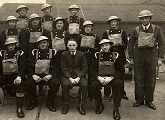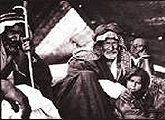The Great War
¤ Introduction ¤ Collections ¤ Links ¤ Reading
 *
* *
* *
*
Photographs copyright © University of Dundee Archive Services;
The Women's Library, London Metropolitan University; Leeds University
Library; Bangor University. These are links to larger images.
To mark the 90th anniversary of the start of the First World War, the Scottish Centre for War Studies at the University of Glasgow is hosting an international conference, which will focus on the origins of the war, the influence of the war on writers, and reactions on the Home Front.
Britain declared war against Germany on August 4th, 1914, in response to the German invasion of Belgium. Within less than a year, the conflict had spread across five continents.
Initially there was strong support for the war. Women's suffrage organisations suspended their militant political activities to take part in the war effort. The Scottish Federation of the National Union of Women's Suffrage Societies (NUWSS) suggested the creation of Scottish Women's Hospitals for Foreign Service: these were medical units staffed entirely by women, funded by suffrage societies and private donations. The women of the Order of the White Feather gave out white feathers to men who had not enlisted, marking them as 'cowards'.
After heavy casualties, and declining numbers of volunteers, compulsary military service was introduced in 1916. Pacifists had the option of non-combat roles, such as medical orderlies, or faced imprisonment. The Society of Friends (Quakers) had established volunteer ambulance units during the Crimean War, 1853-1856, and many served in Friends' Ambulance Units. Fenner Brockway (1888-1988), who helped found the No-Conscription Fellowship, which encouraged the refusal of military service, was court-martialed.
The war in Europe ended on the Western Front on November 11th, 1918. The military conflict continued elsewhere, with the Allied Intervention in the Russian civil war, and involvement in Mesopotamia and the Middle East.
This month we are highlighting just a few of the archive collections on the Hub which reflect individual experiences of the war.
¤ Introduction ¤ Collections ¤ Links ¤ Reading
You can receive regular updates on our special features by joining our mailing list.





